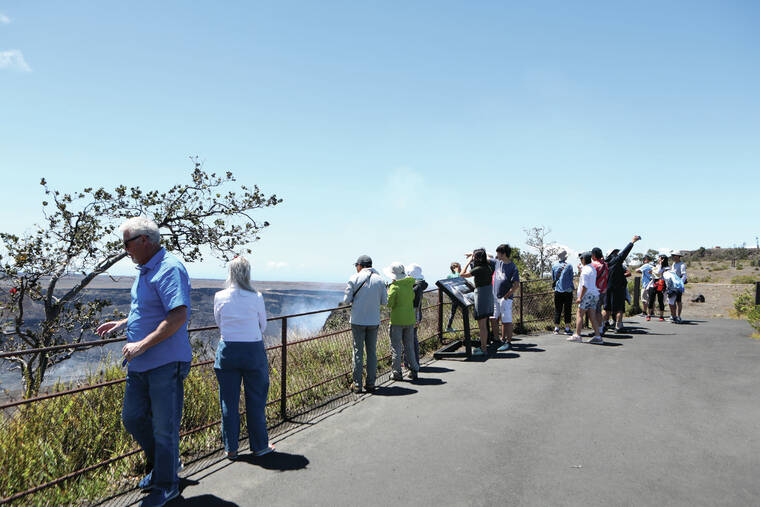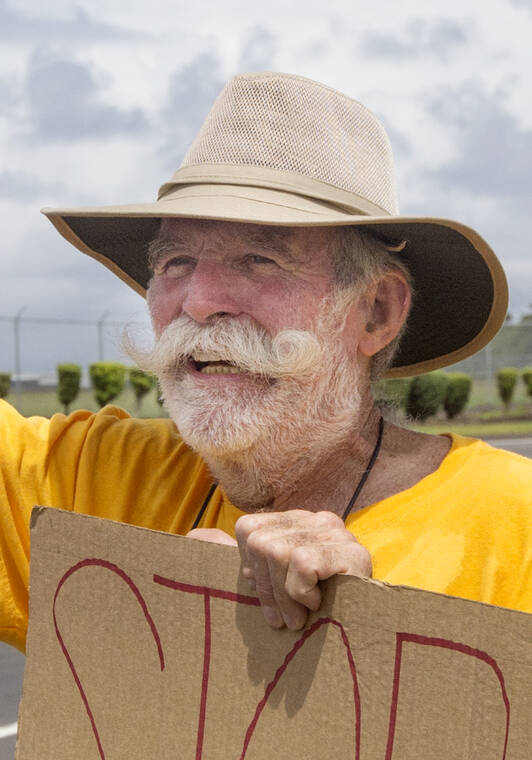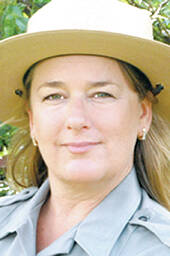National park releases draft air tour management plan

Kelsey Walling/Tribune-Herald file photo Tour groups and visitors look at the eruption in the Halemaʻumaʻu crater in 2022 at Hawaii Volcanoes National Park.

Bob Ernst

FERRACANE
The National Park Service and Federal Aviation Administration on Monday released a draft Air Tour Management Plan (ATMP) and an associated draft Environmental Assessment mandated by a 2000 law and ordered by a federal appeals judge in 2020 in response to a lawsuit by a community group.
The National Park Service and Federal Aviation Administration on Monday released a draft Air Tour Management Plan (ATMP) and an associated draft Environmental Assessment mandated by a 2000 law and ordered by a federal appeals judge in 2020 in response to a lawsuit by a community group.
The federal agencies are seeking public feedback on the draft documents, which contain proposals to regulate air tours over and near Hawaii Volcanoes National Park.
ADVERTISING
The issue is noise from tour helicopters that fly over the park.
The proposed plan would: authorize up to 1,565 air tours a year using three defined routes; designate Wednesdays for quiet-technology (QT) flights only during the hours of 9 a.m. to 5 p.m.; designate no-fly days on Sundays; and establish specified flight times of 10 a.m. to 2 p.m. for non-QT flights and 9 a.m. to 5 p.m. for QT flights on days other than Wednesday or Sunday.
“The objective of this ATMP, which was set through the National Parks Air Tour Management Act, is to develop acceptable and effective measures to mitigate or prevent significant adverse impacts, if any, of commercial air tour operations on the park’s natural and cultural landscapes and resources, Native Hawaiian sacred sites and ceremonial areas, wilderness character, and visitor experience inside the ATMP planning area,” said HVNP spokeswoman Jessica Ferracane.
According to the plan, 1,565 is 14% of the average of 11,376 flights per year flown by 10 tour operators at the park between 2017 and 2019.
“At the most basic level, the annual flight limits in the draft ATMP are intended to protect cultural resources and related cultural landscapes and ethnographic resources throughout the park by limiting the number of potential disturbances caused by commercial air tours,” Ferracane said.
Public feedback can be submitted through the NPS Planning, Environment and Public Comment (PEPC) website starting at today and ending at 8 p.m. June 16. The NPS and FAA will consider comments to help inform the final ATMP for Hawaii Volcanoes National Park.
The draft ATMP and EA are available at: https://parkplanning.nps.gov/document.cfm?documentID=128163.
The NPS and FAA will hold a virtual meeting from 6 p.m. to 7:30 p.m. June 7 on Zoom.
“We encourage everyone who is interested in air tours over the park to review the materials and provide comment and participate in the public meeting,” said Ferracane.
The spokesman of one of the two groups that successfully sued the FAA and NPS, Bob Ernst — a founding board member of Hawaii Island Coalition Malama Pono, or HICoP — expressed his displeasure Wednesday with the plan released by the federal agencies.
“Twenty-four years of total failure by the FAA (and) NPS bureaucrats to implement the congressionally (and) court-mandated ATMP, and the totally unnecessary incessant tour copter noise nuisance pollution will continue over our treasured sacred Hawaii Volcanoes,” Ernst said in a statement. “The FAA mandates more helicopter noise elimination for urban Long Island since 2008, one mile offshore at an altitude of 2,000 feet, than is now offered in the Hawaii Volcanoes draft ATMP.”
Ernst referred to a March 31, 2022, op-ed piece in the Tribune-Herald by U.S. Rep Ed Case, a Hawaii Democrat, who wrote, “We should enact full protections for our national parks and ban (air) tours outright in the ATMP areas.”
“We agree with Rep. Case, tour aircraft should be prohibited from operating over Hawaii Volcanoes National Park,” Ernst said, and urged that comments from the public include the words “no fly.”
The three air routes proposed in the draft document are the Pu‘u O‘o route, the Kahuku route and the coastal route.
The Pu‘u O‘o route consists of a route along the east rift zone of Kilauea in the Pu‘u O‘o area with a single entry and exit over the ocean. Tours using this route would be required to fly at an altitude of at least 1,500 feet over land and 2,000 feet over water. Aircraft would be allowed to hover, loiter and/or circle for up to five minutes on this route. Those maneuvers are prohibited on the other two routes.
The Kahuku route is a bi-directional route across the south side of the park’s Kahuku unit in Ka‘u. Tours using this route would be required to fly at an altitude of at least 1,500 feet.
“This route would provide access for Kailua-Kona flights and circle-island tours to provide expansive views of Mauna Loa from the summit to the sea and past volcanic activity while protecting endangered birds found at higher elevations and eligible wilderness in Kahuku,” the draft EA states.
Air tours on the coastal route would maintain 2,000 ft. lateral distance from shore and a minimum altitude of 2,000 feet, according to the plan.
That route would be available “only if commercial air tour operators can safely adhere to the required altitude and distance to the shore,” the draft EA states. “… The route would protect wilderness areas, backcountry campgrounds, cultural and sensitive resources within the park.”
With the draft ATMP limiting the number of commercial air tour operations during the year, the Air Tour Management Act of 2000 requires a competitive bidding process be conducted.
Until that can be done, commercial air tour operators will be allocated a certain number of commercial air tours over the park, referred to as the initial allocation, based on the numbers of flights flown between 2017 and 2019.
The lion’s share of the initial allotment, according to the draft EA, 1,176 flights would go to Helicopter Consultants of Maui Inc., which includes Hawaii Helicopter and Blue Hawaii Helicopter. Safari Helicopter Tours would be a distant second at 185 flights, with Sunshine Helicopters Inc., at 109 flights, the only other air tour company initially allotted 100 or more flights.
Email John Burnett at jburnett@hawaiitribune-herald.com.


